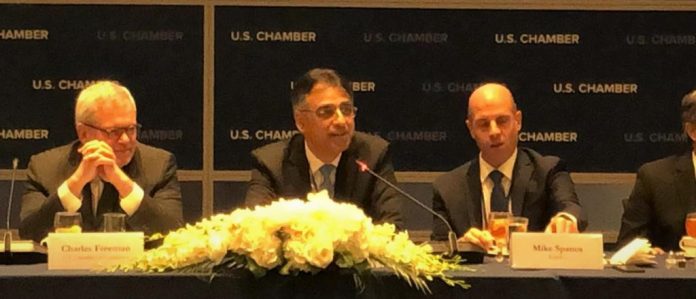- A staff level mission will be visiting Pakistan this month to finalise the Memorandum of Economic and Financial Policies, which will be presented to IMF Board for final agreement
ISLAMABAD: Pakistan and International Monitory Fund (IMF) have reportedly finalised the talks for the next bailout programme and have agreed to move forward towards the staff level agreement, it has been learnt.
According to sources, after the positive talks with the IMF officials in Washington, the Fund would be sending its mission to Pakistan this month to finalize the agreement.
“We can say that both sides have finalized talks after which the staff level mission will be visiting to finalize the Memorandum of Economic and Financial Policies (MEFP), to be presented the same to IMF Board for a final agreement,” said an official. “With the finalization of the remaining process, the final agreement for next bailout package will most likely conclude near June/before next financial year.”
The financial budget of 2019-20 will be made in light of the IMF programme, he claimed.
Minister of State on Revenue Hammad Azhar, during a press conference on Thursday, also claimed that the talks with IMF officials went positive. “We will decide about modalities of the agreement when the staff level mission arrives in Pakistan,” he added.
Apart from other conditions, Dr Ashfaq Hassan, renowned economist, said that the IMF’s condition of generating 34pc more revenue (Rs5.4 trillion) was unrealistic and difficult to meet.
On the other hand, he added, unlike the IMF’s targets, the Federal Board of Revenue has already proposed the government to fix its target in the range of Rs5.1 trillion in the next budget 2019-20 against revised estimates of Rs4.1 trillion for the outgoing financial year.
Apart from the revenue side, curtailing of primary balance within the desired limits will be the biggest challenge for the government to strike the initial agreement (staff-level), sources said.
Ahead of the talks in Washington on next bailout programme, IMF had projected a sharp decline in GDP growth rate for Pakistan from 5.2pc in 2018 to 2.9pc in 2019 and a further decline to 2.8 in 2020. It projected a sharp rise in inflation from 3.9pc in 2018 to 7.6pc in 2019.
IMF in its latest report “World Economic Outlook (WEO), Growth Slowdown, Precarious Recovery” states that in the absence of further adjustment policies in Pakistan, growth is projected to remain subdued at about 2.5pc, with continued external and fiscal imbalances weighing on confidence.
As per official statement of Ministry of Finance, Finance Minister Asad Umar held a series of meetings with the IMF and World Bank official as part of the IMF/World Bank Spring Meetings 2019.
Umar met the new head of the World Bank David Malpass and briefed him on Pakistan’s macroeconomic situation. They also discussed the continuation of Pakistan’s ongoing engagement with the bank. Malpass appreciated the reform process in the country and assured continued World Bank support.
During his meeting, World Bank officials assured him of complete cooperation with Pakistan.
He also met officials of the IMF, including its First Deputy Managing Director David Lipton, and spoke about the ongoing negotiations with the IMF.
The finance minister also met members of the US-Pakistan Business Council and assured them that the government is working to facilitate foreign investors.
“We are trying to make it easier for foreign companies to invest in Pakistan,” he told companies like Facebook, Uber, Procter & Gamble, Coca Cola and Pepsico at a roundtable conference.
The companies expressed keen interest in Pakistan’s market and shared their future plans as well as issues where they needed support from the government.




